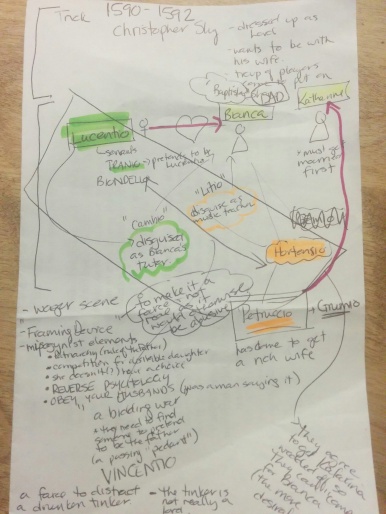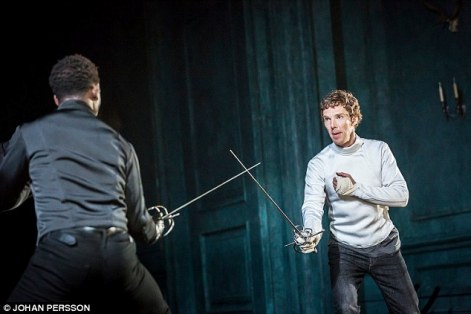I have this ‘thing’: I really really love Shakespeare. I blame it on my parents (who forced us kids into a deep engagement with the texts of The Bard). And so, the goal has been to pass this love of Shakespeare onto my children. Part of the goal is purely self-centred: I enjoy going to see the plays, and in some ways, taking the kids is a way of ensuring that I can talk about the plays when I get home. But in trying to pass this love along, I have developed an appreciation of the hard work that was done by my parents. It is not an easy task to teach one’s kids a love of iambic pentameter. However, it has been made somewhat easier by the move of theatre companies to do cinematic broadcasts. Thank you NT Live and Stratford HD! It is such a gift to be able to take the kids to the local movie theatre and see some of the best actors in the world bringing their craft to bear in an astonishing range of Shakespeare’s famous and lesser known plays.
But lest any parent out there think that it has been easy for me to get my kids off to see Shakespeare, I will put the more disreputable dimensions of my parenting skills on the table: I do use both ‘guilting’ and ‘bribery’ to get them there (or, both the carrot and the stick). The guilt side is of course not optimal, but it does go some distance: my kids both assert that I have some exceptional abilities to explicity offer them the freedom to decline my invitations while simultanously delivering implicit messages of disappointment in them should they operationalize their freedom (Ah well…. I blame my father for enabling this skill set in me).But I think my skills in bribery have actually been the stronger tool. Bribery is something I learned from watching my mother work with the younger siblings in our family! 🙂
On the bribery front, I work two angles:
- I let them smuggle in as much junk food as they can [relatively quietly] eat during the show, and
- I let them earn money [$1 per answer, up to a pre-set $20 limit] by asking or answering questions after the show. In short, there is an opportunity to do some learning, and to have some testing! (a teacher’s dream!)

There is some advance work to be done to make the bribery effective (in a pedagogical sense). I have found that they have needed some framework to be able to follow the plot in a Shakespearean adventure. If you are to follow me, then you need to have a sense of what will happen in the play before getting to the theatre. Again, my model is my mother. Prior to the event, I generally head out to the web, and spend a bit of time just trying to get the names of the main characters on a piece of paper. It is messy, but it helps me to be able to have some snapshot points in mind, so I can “SEE” some connections (and make them visible in advance for the kids)
I generally try to give the kids some info in advance like:
- the year the play was written (so i can say “420 years ago!”)
- the names of main characters and the ‘teams’ they belong to
- framing devices they might see
- political or human issues at the centre of the play
- ways to read with or against the grain in an old play

So, for example, when we went to the movies for the broadcast of the Stratford production of The Taming of the Shrew, here were some of the preliminary discussions:
- What is a framing device? This let us talk about the ‘play within the play’. Then we could ask about the relationship between 1. the actors in the framing story ‘tricking’ Christopher Sly into thinking that he [and they] are something other than what they are, and 2. the way the ‘Shrew’ story can also be about people who are other than what they seem to be.
- Look for people in the play pretending to be someone else Here, the goal was (in advance) to try to count each time someone dressed as someone other than what they were.
- What are some misogynist/violent elements in the play? Here, we talked about 1. “Patriarchy” – Rule by the Fathers, and the ways Fathers in this play have control over the choices of both their daughters AND their sons 2. How the men are able to ‘compete’ for the desirable daughter, and how those men are able to put aside that competition to work together to get the undesireable daughter married off first 3. The ‘violence’ present in the supposedly ‘non-violence’ of depriving Katerina of food, sleep, and nice clothing, and in doing so until she agrees that the world is the opposite of what she sees.
- What are different ways of seeing this misogynist play-within-a-play? we talked about seeing it as 1. A Farce to distract a drunken tinker (Christopher Sly) 2. A piece of Irony – that is, as making fun of patriarchy 3. A historical play documenting how things were ‘in the past’ 4. An argument re-enacted today in support of misogyny – that is, taking it as inviting us to affirm its message about how women should be and how the violence against them might be validated 5. as a piece of contemporary critique – asking us to draw connections between what seems over the top, and what is present in different ways in our own society.

At other times, and with other plays, the bribery ‘quiz’ will be related to famous quotes. So, for example, in the week before we went to see the NT live version of Hamlet (with Benedict Cumberbatch!), I went to the web, and printed off a page with the top 20 most famous quotes from the play. I stuck it up on the wall in the kitchen. Over meal times, I read the quotes to the boys, and said a bit about what the phrases meant (again, you can rely on the web and a short amount of pre-reading…indeed, the web will have pages that EXPLAIN those famous lines for you). Then, at the play, in order to earn money, all the kids had to do was poke my arm when they heard those lines show up in the play (but hopefully not poke me too hard). Again, the result was that some of the language of Shakespeare was in their ears and minds before we got there, and then was attached to the action of the play itself.
So… while it might be preferable if I did not need to rely on bribery to get my kids to come see Shakespeare with me, rely is what I have done. And in my case, bribery has been efficient (cheaper than paying a tutor!) The result is that my kids can listen to the language of Shakespeare without being defeated by it, can follow the plots, and laugh at the humour, and keep me company in the cinema (so I don’t have to go alone). It is a win-win!
Thanks mom and dad for passing on guilt and bribery as parenting tools!
You have captured how much fun an adult gets to have while they set up potential fun for their kids. Surprisingly for me, sometimes what I think will be a hit, flops. And at other times, pieces of information which I thought were tangential, become long lasting ideas.
There just is no way to judge what is going to go on in the mind of a teen. Nor of an adult as well. So surprising, all of this. Thank you for capturing it and for casting on Kelvin, guilt and giving me full access to bribery.